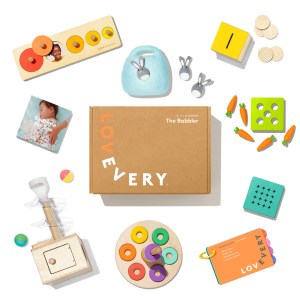Collecting and transporting

A few months ago, your toddler might have carried objects from one place to another one-by-one in their hands. Somewhere between 17 and 24 months, they will start to get more strategic, using a bucket or container to be more efficient.
Their little bustling movements might not seem to have a purpose to you, but your toddler definitely has a plan 😉 They’re starting to use tools to solve problems, thinking ahead and inventing new methods to reach their goals.
Walking while carrying (or pushing) an object requires more coordination and motor skills than walking empty-handed. By holding on to a bucket or basket while walking, your toddler learns they can carry several items from place to place.
The best containers for transporting have two rigid handles and a wide opening, like a basket. Baby strollers and small shopping carts are appealing for this purpose too.
Your toddler is also learning to put a group of items into a container without taking any out until they’re finished. Putting objects in containers and taking them all out again increases focus and extends your toddler’s attention span. They are practising more refined grasp and release skills while cultivating independence.
How to support your transporting toddler:
Walk backwards

To practice walking backwards, ask them to help you carry the large bucket to another part of the room. Let them walk backwards, holding one edge of the bucket while you slowly push the other.
Model transporting
Show your toddler how to use the bucket to transport or carry things during play.
Place small items in a container

Give your toddler a group of items (maybe some beads from the lacing kit) and a container, and encourage them to put all the beads into the container. Mastering this skill may also make clean-up more fun 💫
Find and collect treasures
Give your child a container and take them on a walk outside or around your home. See if they want to pick up “treasures” they find along the way, and invite them to put everything they find in the container. You might be surprised by how long your toddler will be happy to walk, picking up treasure after treasure for their collection.
Pack your bags

Allow your toddler to help you pack a bag when you’re going on an adventure. They can put in nappies, wipes, a water bottle, snacks, books, or small toys.
Build motor skills
Your toddler will build gross and fine motor skills—as well as curiosity—as they walk, squat, and collect objects.
In this post

The Play Kits
The Play Kits by Lovevery are thoroughly tested, baby safe, eco-friendly and Montessori inspired. Give your child the best start with our stage-based play toy subscription boxes.
Learn moreKeep reading


16 - 18 Months
Welcome to The Adventurer Play Kit for months 16-18
Watch Lovevery CEO Jessica Rolph introduce the Pioneer Play Kit for months 16 to 18 of your toddler's life.


16 - 18 Months
Puzzling over puzzles—what the progression looks like
Puzzles build fine motor skills, hand-eye coordination, and problem-solving strategies. Here is the progression of puzzle solving for babies and toddlers.


16 - 18 Months
Introducing the Wooden Stacking Peg Board—the Montessori way
Watch Lovevery CEO Jessica Rolph and Montessori expert Jody Malterre as they show some of the many ways your toddler can use the Wooden Stacking Pegboard.
